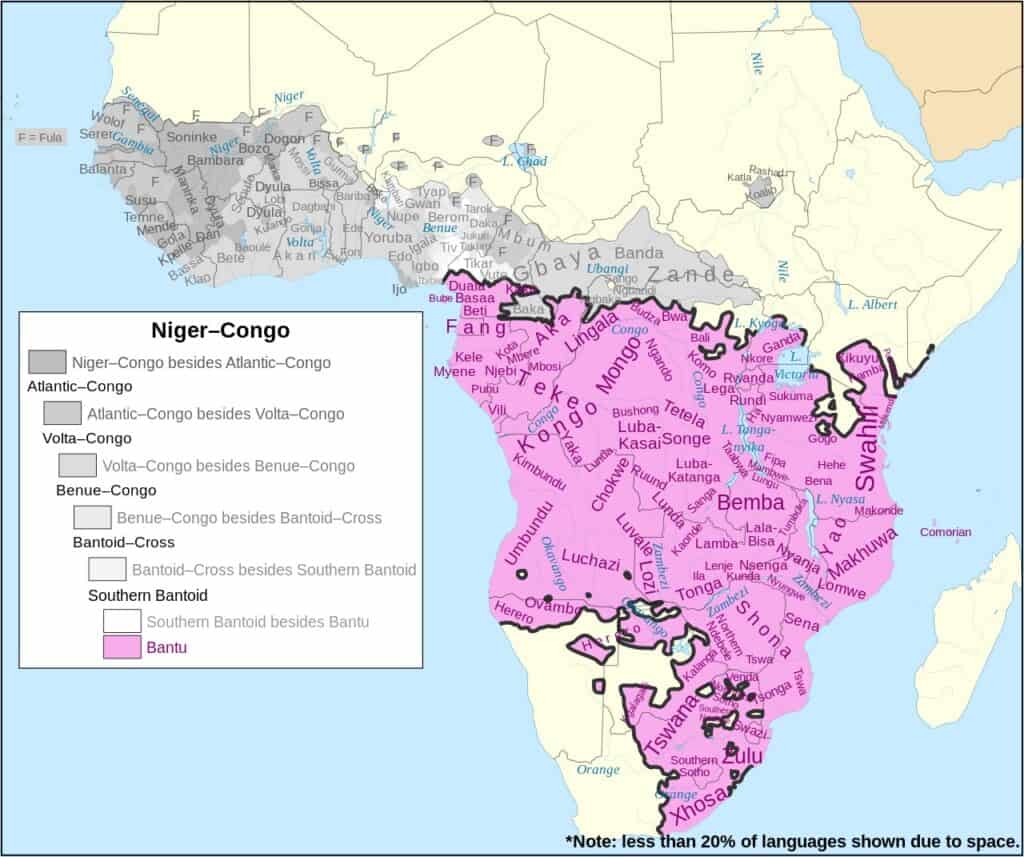Table of Contents
The Bantu peoples form an ethnolinguistic group comprising around 400 distinct native African ethnic groups who speak Bantu languages. These languages are spoken across 24 countries, covering a vast region from Central Africa to Southeast Africa and Southern Africa.
There are several hundred Bantu languages. Depending on the criteria for defining a “language” versus a “dialect,” estimates range from 440 to 680 distinct languages.
The total number of Bantu language speakers is in the hundreds of millions, with roughly 350 million in the mid-2010s, accounting for about 30% of Africa’s population and roughly 5% of the global population. In the Democratic Republic of the Congo alone, approximately 60 million speakers (as of 2015), divided into about 200 ethnic or tribal groups, can be found.
The larger Bantu groups have populations of several million each.
For example, the populations include the people of Rwanda, Tanzania, Uganda, Kenya, and Burundi (25 million), the Baganda people of Uganda (5.5 million as of 2014), the Shona of Zimbabwe (17.6 million as of 2020), the Zulu of South Africa (14.2 million as of 2016), the Luba of the Democratic Republic of the Congo (28.8 million as of 2010), the Sukuma of Tanzania (10.2 million as of 2016), the Kikuyu of Kenya (8.1 million as of 2019), the Xhosa of Southern Africa (9.6 million as of 2011), and the Pedi of South Africa (7 million as of 2018).

Specific Bantu Creation Stories
Zulu Creation Story
In Zulu mythology, the creator god Unkulunkulu emerged from a reed and began to create everything, including humanity, animals, and the physical features of the world.
Unkulunkulu took reeds from the swamp and formed the first human beings, teaching them how to hunt, make fire, and cultivate crops.
Shona Creation Story
The Shona people of Zimbabwe believe in a supreme god called Mwari, who created the world.
According to the story, Mwari created the first man and woman from soil. They were placed in a beautiful garden and were instructed to take care of it, but eventually, they had to leave due to disobedience, similar to the concept of the Garden of Eden.
Kikuyu Creation Story
The Kikuyu people of Kenya believe in a god named Ngai, who lives on Mount Kenya (Kirinyaga).
Ngai created the first man, Gikuyu, and the first woman, Mumbi. They were placed at the sacred fig tree, Mukuyu, and from them descended the nine Kikuyu clans.
Luba Creation Story
The Luba people of the Congo have a creation story involving a deity called Kalumba.
In this myth, Kalumba created the world and then sent a chameleon to test if the earth was dry. After the chameleon confirmed that it was, Kalumba created human beings.

